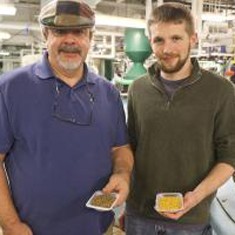A new 100 percent vegetarian feed will help the aquaculture industry be completely sustainable in the future, according to researchers who developed the diet.
100 percent vegetarian feed will help the aquaculture industry be completely sustainable in the future, according to researchers who developed the diet.
“Aquaculture isn’t sustainable because it takes more fish to feed fish, than are being produced. But a new vegetarian diet might change everything,” said Aaron Watson, PhD, a graduate assistant at the University of Maryland Center for Environmental Science’s Institute for Marine and Environmental Technology. Watson and Allan Place, professor at the University of Maryland, published their findings in the August issue of the journal Lipids.
While manufacturers are selling fishmeal replacement diets, this is the first complete replacement of both fishmeal and fish oil, Place told SeafoodSource. “We believe it is not commercially available at this time,” he said. However, the diet formulation is an open formulation published in Lipids and other journals. “Any current feed maker could bring it to market now,” Place said.
Working with the USDA’s Agriculture Research Service, the researchers replaced fishmeal with a blend of plant protein sources for cobia and other high value carnivores. The researchers replaced the fishmeal with a food made of corn, wheat and soy. Because fish oil is expensive and scarce due to its popularity as a health supplement for humans, it was replaced with soybean or canola oil, along with algae sources and amino acid supplements such as taurine.
In comparing plant protein and fishmeal diets in cobia, there was no difference in the growth rate of the fish, Place said. However, the diet made from soybean oil and thraustochytrid meal “significantly outperformed” the fish oil control diet in terms of weight gain, feed conversion ratio, and protein efficiency ratio.
The new findings will not only ease pressure on catching wild fish, the vegetarian diet will also produce fish with significantly lower levels of mercury and PCBs, according to Place.
“Right now, you are only supposed to eat striped bass once every two weeks. [With vegetarian fish meal] you can eat aquaculture-raised fish twice a week because levels are so low,” he said.
 100 percent vegetarian feed will help the aquaculture industry be completely sustainable in the future, according to researchers who developed the diet.
100 percent vegetarian feed will help the aquaculture industry be completely sustainable in the future, according to researchers who developed the diet.“Aquaculture isn’t sustainable because it takes more fish to feed fish, than are being produced. But a new vegetarian diet might change everything,” said Aaron Watson, PhD, a graduate assistant at the University of Maryland Center for Environmental Science’s Institute for Marine and Environmental Technology. Watson and Allan Place, professor at the University of Maryland, published their findings in the August issue of the journal Lipids.
While manufacturers are selling fishmeal replacement diets, this is the first complete replacement of both fishmeal and fish oil, Place told SeafoodSource. “We believe it is not commercially available at this time,” he said. However, the diet formulation is an open formulation published in Lipids and other journals. “Any current feed maker could bring it to market now,” Place said.
Working with the USDA’s Agriculture Research Service, the researchers replaced fishmeal with a blend of plant protein sources for cobia and other high value carnivores. The researchers replaced the fishmeal with a food made of corn, wheat and soy. Because fish oil is expensive and scarce due to its popularity as a health supplement for humans, it was replaced with soybean or canola oil, along with algae sources and amino acid supplements such as taurine.
In comparing plant protein and fishmeal diets in cobia, there was no difference in the growth rate of the fish, Place said. However, the diet made from soybean oil and thraustochytrid meal “significantly outperformed” the fish oil control diet in terms of weight gain, feed conversion ratio, and protein efficiency ratio.
The new findings will not only ease pressure on catching wild fish, the vegetarian diet will also produce fish with significantly lower levels of mercury and PCBs, according to Place.
“Right now, you are only supposed to eat striped bass once every two weeks. [With vegetarian fish meal] you can eat aquaculture-raised fish twice a week because levels are so low,” he said.





